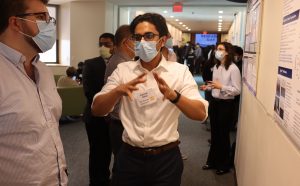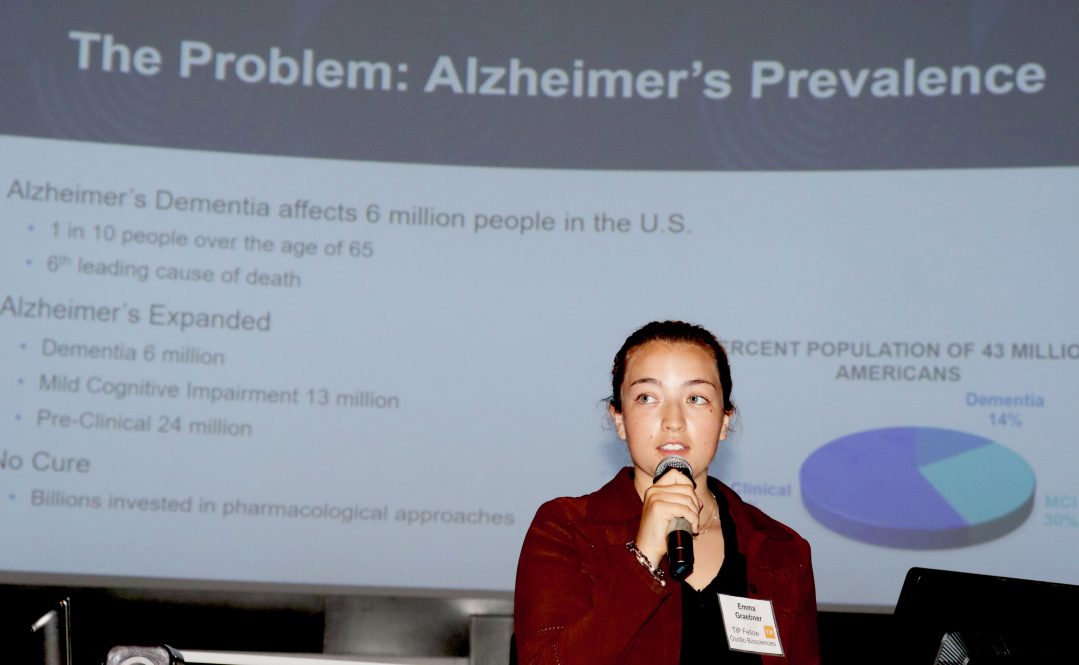The students in the TIP Innovation Fellowship and Health Research programs spent their summers working directly with world-class minds and savvy entrepreneurs. On the last Friday in July, it was time for the students to show off what they learned.
Summer Research Day at UConn Health offered the chance for the members of the respective programs to present their findings, pitch ideas, and make lasting impressions on peers and professionals. It was the culmination of weeks of intense work, with students learning and executing advanced research skills, analyzing data, and performing a variety of other tasks across many different disciplines.
“We’re really excited to bring together these two different groups, because really developing research, life science, STEM, health careers, moving technology forward is the face of the 21st century,” said Caroline Dealy, founder and director of the TIP Innovation Fellowship program.
The Technology Incubation Program (TIP) invites its startups to host students as fellows. This year, the program had its largest cohort ever, participating with companies at UConn’s three incubators in Storrs, Farmington, and Stamford.

TIP is a division of UConn’s Technology Commercialization Services (TCS), dedicated to expediting the transformation of University discoveries into products and services that benefit patients, society, and industry. Abhijit Banerjee, associate vice president for innovation and entrepreneurship, praised the fellows and health researchers as the innovators and problem-solvers of the next generation.
UConn’s TIP companies span a multitude of areas, from medicine to digital technology to gadgetry and devices. The students’ experiences represented the full gamut as well. Kashish Manchanda ’23 (BUS), a business analytics and finance major from UConn Hartford, was a fellow at Storrs-based Aqualumos, working to make water safer by eliminating toxic, manmade chemicals called PFAS.
Aqualumos CEO Nikolas Franceschi-Hoffmann ’19 (BUS, ENG) took on Manchanda and Jonathan Dias ’22 (CLAS) as fellows. Franceschi-Hoffmann said the students were integral parts of business, working on complex problems involving PFAS contamination, lab tests, and design challenges.
“It’s a really great program that lets us interact with students often times outside of the specific focus that we’re in,” Franceschi-Hoffmann said. “We had a business analytics student and a biology student, which is far outside the realms of chemical engineering, but they brought some great fresh new perspectives to the team in terms of what we are doing and how to move forward.”
In the social sciences, Claire Lee ’24 (CLAS), a double major in ecology and evolutionary biology and political science, spent her summer with Social Labs at TIP Digital in Stamford. Her work – along with her peers Siddarth Pai ’22 (BUS) and Nashwa Siddique ’22 (BUS) – was dedicated to citizen journalism and providing a reliable platform for honest news.
In Siddique’s case, the fellowship led to a career opportunity. After graduating with a degree in management information systems, she is staying on with Social Labs to help develop the platform.
In between digital presentations, students from both the Fellowship program and the Health Research program presented posters on their findings and discoveries. The latter offers a pathway into undergraduate research for students with interests in health and biomedical sciences.
“As a research university, it is it is absolutely UConn’s mission to involve our students in research, creativity, innovation, and discovery from the moment they arrive,” said Caroline McGuire, the director of the Office of Undergraduate Research and executive director of enrichment programs. “The Health Research program is a wonderful opportunity to connect undergraduate students at a variety of UConn campuses with amazing researchers here at UConn Health.”
Biomedical engineering major Erica Doyle ’24 (ENG) researched femoral phenotype of gene PRGG4 in mice, working with biomedical engineering professor Tannin Schmidt. The experience opened her mind to new pathways, and she is considering a possible career in medicine.
“Prior to this program I had minimal research experience and had no idea what I wanted to do after graduation, but after spending the summer in the lab I definitely think I want to pursue higher education,” Doyle said. “It was a really insightful experience and helped me figure out where I want to go in the future.”



